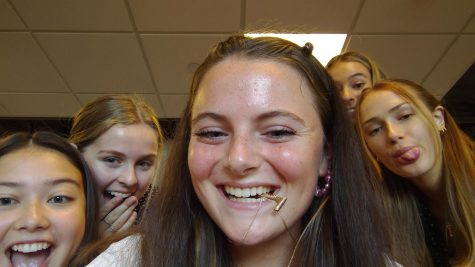Listen Up!
October 15, 2019
In the exciting, dramatic, fast-paced existence that we call life, people have made it a habit to argue. Debate. Have charged conversations. We listen to respond, make sure to say “I hear you,” then continue on to contradict their opinion, or give them a piece of our minds. Rarely do we make an effort to place ourselves in another’s shoes, sympathize with them, empathize with them. No. It seems most important, now more than ever, for us to thrust their opinions in the spotlight, ensuring they are heard and accounted for.
Since we were little, we’ve been taught the rules of listening: look the speaker in the eye, nod and smile, respond with a summary of what you’ve heard. The basics. Has it ever occurred to our teachers, though, that if we were indeed listening, we wouldn’t need to follow these rules?
Celeste Headlee, award-winning journalist, and radio host, said: “there’s no reason to show you’re paying attention if you are, in fact, paying attention.” An interested listener will appear so through their responses and questions. A person who is present, asks open-ended questions and shows genuine effort in understanding what their partner is saying is a person who is clearly listening. One could simply look a speaker in the eye, smile and nod, and respond with a summary of what they’ve heard, checking all the boxes on the “listening checklist,” without fully understanding even one word of said speaker.
In order to become an engaged and honest listener, it is best to enter into a conversation with an open mind and a desire to learn.
Dr. Rosellini, one of Seattle Prep’s three guidance counselors, commented on his favorite tips for becoming a good listener: “I think the number one thing to do when listening is to be fully present in hearing the other person. I say that because often times we might have a lot going on in our mind (e.g. to-do list, social stuff…) and if we get caught up in that, we will not be fully listening, and the other person will pick up on that. To be a good listener is to be attuned to them and their stories. This means maintaining eye contact, monitoring body language and facial expressions, and responding accordingly. This also means trying not to jump in with your own opinion or judgment immediately.”
Bill Nye once said, “everyone you meet knows something you don’t.” Similarly, the Dalai Lama said “When you talk, you are only repeating what you already know. But if you listen, you may learn something new.” If this is the case, then any conversation can turn into an interesting one. It is up to us to put in the effort and energy that is required to truly listen.
In addition to our own personal benefit, listening benefits others. If we, for example, listen to our parents and truly understand what they’re telling us, we could save ourselves from many an argument. By understanding their point of view, we show them that we care about what they have to say. In most cases, this makes them more sympathetic to our own opinions. We don’t have to agree with them. We probably won’t. But, if we’ve truly listened, we’ve equipped ourselves to tell them why, citing evidence from their own argument.
Listening: It’s a win-win.
Now, there are times when you won’t want to listen. When, for example, your friend is talking to you about the significance of Harry Styles new music video on his career, and you couldn’t care less. In this case, flip the situation around! Ask questions that are interesting to you, like “wow, where’d he film that?,” or “does he write his own songs?” You don’t have to like a conversation topic to be a genuine listener.
When asked about staying present in a difficult conversation, Dr. Rosellini said “it is important to hear what someone is saying and not zoom in on one word or sentence that might feel critical. This happens all the time where we auto-filter what someone might be saying to us based on how a previous conversation went, and then we might get defensive quickly or respond with anger.”
So, no one is listening. Is it because we don’t want to, or because we don’t know how? Either way, its about time we start. With politically charged situations surrounding us, like the presidential debates and an impeachment trial (to name a few), it’s important to set a listening precedent to ensure total understanding between parties and avoid pointless conflict. What’s the point of arguing, anyways, if your point isn’t understood by others?
Listening is hard. It takes effort and skill, and it’s not always fun. But, it’s a skill that can be easily learned. According to Dr. B, a person can become a great listener through “practice, having as many conversations as possible, and monitoring how present they are in their listening.”
So, practice every day, and encourage yourself to really listen to others. What’s the worst that can happen?


